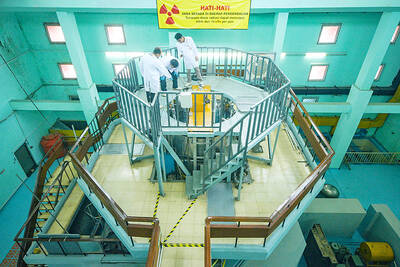The US and European nations together mark the 60th anniversary of NATO this week, but it is unclear whether all share the global ambitions for the world’s biggest military alliance.
“The US is re-engaging with Europe and Europe is re-engaging with the US,” a US official at NATO said, ahead of the two-day summit starting tomorrow on the banks of the Rhine River marking the border between France and Germany.
Francois Heisbourg, from the Foundation for Strategic Research in Paris, said: “[US] President Barack Obama’s administration wants to show a cooperative face to the world, notably with its usual European partners.”
While much of the goodwill, from both sides of the Atlantic, has come since Obama won US elections in November, some, like Belgian strategy expert Joseph Henrotin, believe that relations have been improving for some time.
“The real change in the United States as far as Europe is concerned dates back to the second mandate of [former US president] George W. Bush,” he said.
Bush’s decision to launch war on Iraq in 2003 created huge divisions at NATO and amongst Europeans themselves, but in recent years “there has been an attitude [in Washington] that we cannot get by without the Europeans,” he said.
This vision, though, contradicts the attitude of US neo-conservatives, who had long felt that many European nations were out of their league.
Jeremy Shapiro, a researcher at the Brookings Institution, believes that Europe “is still a strategic player,” when it comes to deciding how and when force should be projected when needed.
“It’s the view across the political spectrum that the US is not likely to find more effective and reliable partners in the world. And that is not going to change in the foreseeable future,” he said.
NATO accounts for around 75 percent of the world’s military spending.
But for the Euro-Atlantic partnership to continue a real mission is needed, 19 years after the Cold War.
Even taking into account routinely tense relations with Russia, no direct military threat weighs on the European continent.
One NATO officer said the alliance makes complete sense to Washington.
“While the Europeans are looking for a guarantee of military [security] from the United States, the Americans are coming to look for political support from Europe for their undertakings,” he said.
“Because it operates based on unanimity, NATO is rather a millstone for the Americans,” he said.
“But they stay to transform it into a global alliance meant to control states with bad intentions, while winning respect from Russia and, in the long term, to curb China.”
However, Heisbourg said: “Let’s hope that our American friends don’t push for a coalition along the lines of a League of Democracies. That would lead to a clash of civilizations.”
“If anything can break NATO it is a project of this kind,” he said, adding that it would be against the alliance’s founding treaty and the UN charter, which recognizes only one body with a global vocation: the UN Security Council.

Four people jailed in the landmark Hong Kong national security trial of "47 democrats" accused of conspiracy to commit subversion were freed today after more than four years behind bars, the second group to be released in a month. Among those freed was long-time political and LGBTQ activist Jimmy Sham (岑子杰), who also led one of Hong Kong’s largest pro-democracy groups, the Civil Human Rights Front, which disbanded in 2021. "Let me spend some time with my family," Sham said after arriving at his home in the Kowloon district of Jordan. "I don’t know how to plan ahead because, to me, it feels

Poland is set to hold a presidential runoff election today between two candidates offering starkly different visions for the country’s future. The winner would succeed Polish President Andrzej Duda, a conservative who is finishing his second and final term. The outcome would determine whether Poland embraces a nationalist populist trajectory or pivots more fully toward liberal, pro-European policies. An exit poll by Ipsos would be released when polls close today at 9pm local time, with a margin of error of plus or minus 2 percentage points. Final results are expected tomorrow. Whoever wins can be expected to either help or hinder the

North Korea has detained another official over last week’s failed launch of a warship, which damaged the naval destroyer, state media reported yesterday. Pyongyang announced “a serious accident” at Wednesday last week’s launch ceremony, which crushed sections of the bottom of the new destroyer. North Korean leader Kim Jong-un called the mishap a “criminal act caused by absolute carelessness.” Ri Hyong-son, vice department director of the Munitions Industry Department of the Party Central Committee, was summoned and detained on Sunday, the Korean Central News Agency (KCNA) reported. He was “greatly responsible for the occurrence of the serious accident,” it said. Ri is the fourth person

SKEPTICAL: Given the challenges, which include waste disposal and potential domestic opposition, experts warn that the 2032 nuclear timeline is overambitious Indonesia is hoping going nuclear can help it meet soaring energy demand while taming emissions, but faces serious challenges to its goal of a first small modular reactor by 2032. Its first experiment with nuclear energy dates to February 1965, when then-Indonesian president Sukarno inaugurated a test reactor. Sixty years later, Southeast Asia’s largest economy has three research reactors, but no nuclear power plants for electricity. Abundant reserves of polluting coal have so far met the enormous archipelago’s energy needs, but “nuclear will be necessary to constrain the rise of and eventually reduce emissions,” said Philip Andrews-Speed, a senior research fellow at the